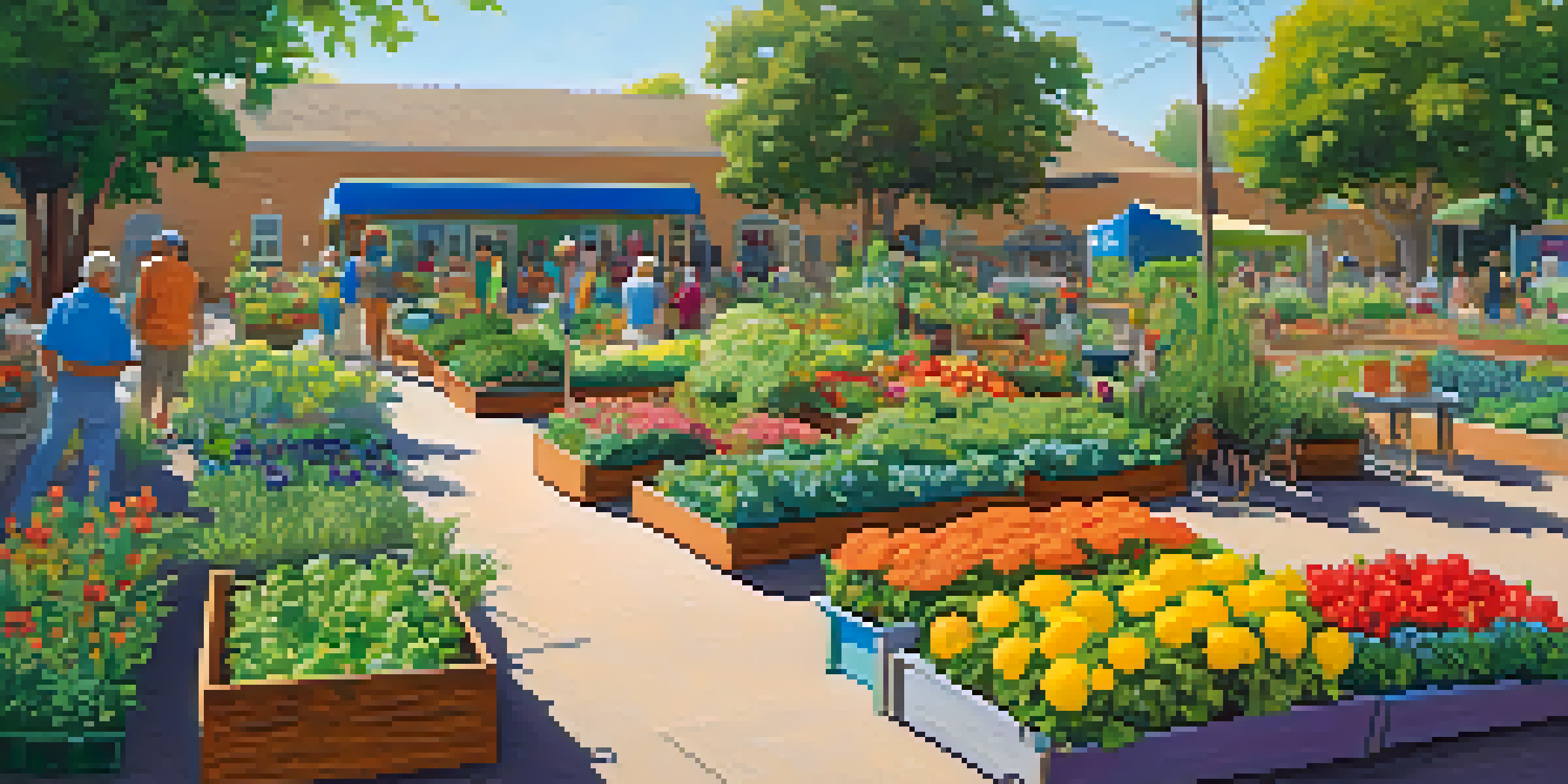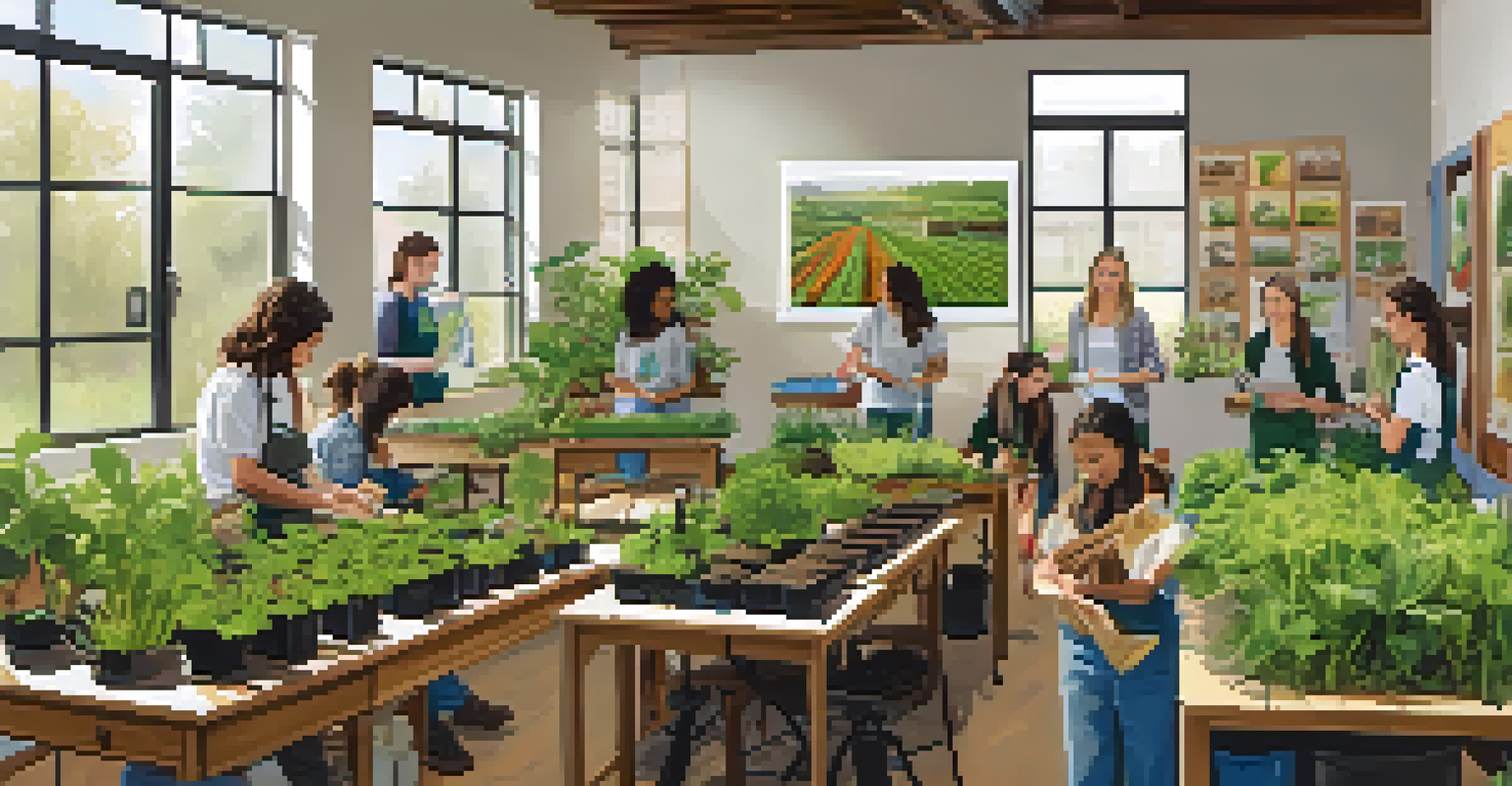Organic Farming Initiatives in Pasadena: A Sustainable Approach

Understanding Organic Farming and Its Benefits
Organic farming is an agricultural approach that emphasizes sustainability, avoiding synthetic fertilizers and pesticides. By focusing on natural processes, it promotes soil health and biodiversity, leading to better ecosystems. This method not only benefits the environment but also produces healthier food options for consumers.
The ultimate goal of farming is not the growing of crops, but the cultivation and perfection of human beings.
In Pasadena, the push towards organic farming has gained momentum, as more residents become aware of the connection between food production and their health. This awareness is driving demand for locally sourced organic produce, which is known for its rich flavors and nutritional value. By choosing organic, consumers can support local farmers while reducing their carbon footprint.
The benefits of organic farming extend beyond personal health. It also plays a crucial role in mitigating climate change by improving carbon sequestration in the soil. As Pasadena embraces organic practices, it sets a positive example for other communities striving for sustainability.
Community Gardens: Growing Together in Pasadena
Community gardens have become a cornerstone of Pasadena's organic farming initiatives, fostering a sense of community among residents. These gardens serve as spaces where neighbors can come together, share knowledge, and grow their own organic produce. Not only do they provide fresh food, but they also enhance community ties and promote social interaction.

The city has seen many successful community garden projects, often led by local organizations and volunteers. These gardens typically feature a variety of fruits, vegetables, and herbs, allowing residents to experience the joy of gardening. Plus, they're an excellent way for individuals to learn about sustainable farming practices firsthand.
Benefits of Organic Farming
Organic farming enhances sustainability and promotes healthier food options, benefiting both the environment and consumer health.
Moreover, community gardens in Pasadena often host workshops and events, educating participants about organic farming techniques. This hands-on approach not only empowers residents but also inspires a new generation of environmentally conscious individuals committed to sustainable living.
Local Farmers Markets: Fresh and Organic Choices
Pasadena boasts vibrant farmers markets that showcase the best of local organic produce. These markets are not just places to buy food; they're community hubs where farmers and consumers connect directly. Shoppers can often meet the growers, learn about their farming practices, and support the local economy all in one place.
Sustainability is no longer about doing less harm. It’s about doing more good.
The farmers markets in Pasadena feature a wide array of organic products, from seasonal vegetables to artisanal bread. This variety allows residents to make healthier choices while also enjoying the flavors of locally grown food. It's an opportunity to embrace seasonal eating, which is not only better for health but also for the environment.
Additionally, these markets often highlight the importance of sustainable agriculture. By choosing to shop locally and organically, consumers are making a statement about their values and supporting environmentally friendly practices that benefit the entire community.
Educational Programs Promoting Organic Practices
Pasadena is committed to educating its residents about the benefits of organic farming through various programs and workshops. Local schools and organizations often host classes that teach people the fundamentals of gardening and sustainable practices. This focus on education empowers individuals to take action in their own backyards.
One notable initiative is the partnership between local schools and community gardens, where students can learn about food systems and the importance of organic farming. These hands-on experiences not only enhance their understanding of agriculture but also promote healthy eating habits from a young age. It's a fantastic way to cultivate a new generation of environmentally conscious citizens.
Community Engagement Through Gardens
Community gardens in Pasadena foster social connections while educating residents on sustainable practices and organic produce.
Moreover, educational programs often invite experts and local farmers to share their knowledge, creating a rich learning environment. By fostering a culture of learning about organic practices, Pasadena sets the stage for lasting change and increased community involvement in sustainable farming.
The Role of Technology in Organic Farming
Technology plays a pivotal role in enhancing organic farming practices in Pasadena. From soil testing kits to apps that help track crop health, modern tools are making it easier for farmers to adopt sustainable methods. These innovations allow for more precise farming, reducing waste and improving yields without relying on chemicals.
Additionally, technology facilitates better communication among local farmers, enabling them to share insights and collaborate on best practices. Online platforms and social media groups have become valuable resources for exchanging information and supporting one another in their organic farming journeys. This sense of community, bolstered by technology, helps foster a culture of sustainability.
As Pasadena continues to embrace both organic farming and technology, the city sets a precedent for how these two elements can work hand-in-hand. This synergy not only benefits local farmers but also contributes to the overall health and well-being of the community.
Challenges Facing Organic Farming in Pasadena
Despite the many benefits of organic farming, there are challenges that Pasadena must address to ensure its growth. One major issue is the high cost associated with organic farming practices, which can deter new farmers from making the switch. Additionally, consumers may be hesitant to pay higher prices for organic products, impacting market demand.
Another challenge is the limited availability of land for farming within the urban landscape of Pasadena. Urban farming initiatives often face zoning restrictions and competition for space, making it difficult for organic farms to thrive. These obstacles require innovative solutions and community support to create sustainable farming opportunities.
Challenges for Local Organic Growth
Pasadena faces challenges such as high costs and limited land availability, which require community support and innovative solutions.
Lastly, education and awareness remain critical in overcoming these challenges. By continuing to promote the benefits of organic farming to the public and supporting local farmers, Pasadena can cultivate a stronger market for organic products. Encouraging community involvement will be vital in addressing these hurdles and ensuring the success of organic initiatives.
The Future of Organic Farming in Pasadena
Looking ahead, the future of organic farming in Pasadena appears promising, with increasing interest from both residents and local policymakers. As more people recognize the importance of sustainable agriculture, it is likely that support for organic practices will continue to grow. This shift in mindset will play a crucial role in shaping the agricultural landscape of the city.
Innovative projects, such as urban farms and vertical gardens, are gaining traction in Pasadena, providing new opportunities for organic farming. These initiatives can maximize limited space while contributing to local food security and sustainability. As these projects develop, they may inspire other cities to adopt similar approaches.

Ultimately, the success of organic farming initiatives in Pasadena hinges on collaboration among community members, farmers, and local government. By working together, they can create a robust framework that supports sustainable practices while enhancing the overall quality of life for residents. The journey towards a greener future is well underway.